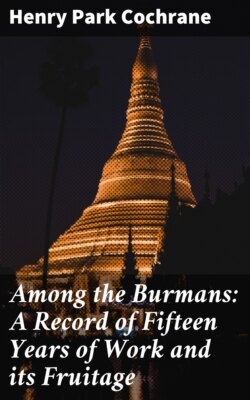Читать книгу Among the Burmans: A Record of Fifteen Years of Work and its Fruitage - Henry Park Cochrane - Страница 6
На сайте Литреса книга снята с продажи.
III
CUSTOMS OF THE BURMESE
ОглавлениеTable of Contents
The Burman is the proudest mortal on earth. Indeed, he is not of earth, according to his own belief, but has descended from fallen angels. Many ages ago certain Brahmas came down from the celestial regions to dwell on the earth. By adapting themselves to the habits of ordinary human beings, they themselves gradually became human. From these Brahmas or fallen angels, the whole Burman nation descended.
The Burman recognizes no superior. The superior advantages of a training in the Western world counts for nothing, because the Burman cannot appreciate such advantages. At one time when in conversation with a Burman official recognized as one of the ablest Burmans in the country, I dilated upon the extent, power, wealth, and resources of the United States, in answer to his many questions about my country.
Wishing to impress him, I made the figures as large as conscience would allow. At last he summed it all up in the self-satisfied expression—"About as big as Burma, isn't it?" A difference of about 70,000,000 in population was not comprehended. He could conceive of nothing bigger or more important than Burma. The Burman kings posed as the Head of Religion. The king was more than human. His subjects were his slaves, with no legal right to anything which he might crave for himself. He could compel them to perform any labour he saw fit to impose. His titles indicate his high estimate of himself: "His glorious and excellent Majesty, Lord of Elephants, Lord of gold, silver, rubies, amber, and the noble serpentine, Sovereign of the Empires of Thunapurtanta and Jambudipa, and other great Empires and countries, and of all the Umbrella-bearing chiefs, The supporter of Religion, Descendant of the Sun, Arbiter of Life, King of Righteousness, King of Kings, and Possessor of boundless dominion and supreme wisdom." That is all. It was well to be somewhat modest, as an example to the people.
The king was "Lord of the White Elephant," for short. That in itself ought to have satisfied a man of ordinary ambition, inasmuch as the white elephant was a sacred animal, and had the "power of making its possessor invincible." "The white umbrella was the emblem of sovereignty in Burma, and its use was limited to the king and the images of Gautama." The Buddhist priest must be content with a more modest title than "Pongyi," the name by which they are now known—for pongyi means "Great Glory," and could be applied only to the king. But when the king fell into the hands of the English the title "Great Glory" went broadcast—to minister to the vanity of the thousands of priests and to be retained by them as a monopoly. Burman officials to this day are equally proud of their titles, from the highest in the land down to the Ywa-Thugyi, the village headman. To address any official by name instead of his title, would be a gross breach of etiquette. In the king's time official etiquette was scrupulously observed, even towards prisoners of the official class. Royal blood must never be shed, even in executions. A blow from a bludgeon on the back of the neck of the stooping victim—or in the case of females, a blow on the front of the neck settled the account. Nor might royal victims be buried. The body, enshrouded in a red velvet sack, was taken in a boat to the middle of the river, and thrown in. It is said that this was sometimes done without the formality of an execution, a few stones in the sack answering the same purpose. Crucifixion was also common. It is claimed that in many instances the victim was first put to death and then the mutilated body bound to the bamboo cross and exhibited as a fearful warning to evil-doers. Dread of being crucified led thousands to migrate to British territory after the annexation of Pegu. The ugly terms "imprisonment," and "execution" were never used at the court of the king. There was a "keeping by" and a "clearing away," to suit the caprice of the king, scores and hundreds being massacred at once, on the merest suspicion of conspiracy. "Uneasy lies the head that wears a crown," was true of Burman kings, and they had a way of making all others of royal blood equally uneasy.
